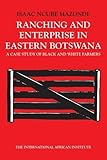Ranching & Enterprise in Eastern Botswana : A Case Study of Black & WhiteFarmers / Isaac Ncube Mazonde.
Material type: TextSeries: International African Library : IALPublisher: Edinburgh : Edinburgh University Press, [2022]Copyright date: ©1994Description: 1 online resource (224 p.)Content type:
TextSeries: International African Library : IALPublisher: Edinburgh : Edinburgh University Press, [2022]Copyright date: ©1994Description: 1 online resource (224 p.)Content type: - 9780748604678
- 9781474470810
- online - DeGruyter
- Issued also in print.
| Item type | Current library | Call number | URL | Status | Notes | Barcode | |
|---|---|---|---|---|---|---|---|
 eBook
eBook
|
Biblioteca "Angelicum" Pont. Univ. S.Tommaso d'Aquino Nuvola online | online - DeGruyter (Browse shelf(Opens below)) | Online access | Not for loan (Accesso limitato) | Accesso per gli utenti autorizzati / Access for authorized users | (dgr)9781474470810 |
Frontmatter -- International African Library -- Contents -- List of Abbreviations -- Preface -- Introduction -- Objective and scope of the study -- The need for research on ranching -- History of settlement and ranching in the Tuli Block -- The Tuli Block compared with other European settlement areas -- Ranching and class formation in post -colonial Botswana -- Summary Overview -- Profiles of settler entrepreneurs -- Vorster, the paternalist entrepreneur -- Phase one -- Phase two -- The Clark family firm: from speculator to technocrat -- Phase one -- Phase two -- Brief profiles -- Benson - the insider entrepreneur -- Mulder- the industrial entrepreneur -- Mediation of settler entrepreneurs -- Bordermanship -- The state and settler mediation -- Dynamics of labour in settler firms -- Settler family labour -- Hired labour in a family firm -- Payment levels of hired workers in the familist firm by section -- Conclusion -- Profiles of local entrepreneurs -- Profiles of local entrepreneurs -- Tau- the upwardly mobile entrepreneur -- Molema- the 'big man' of the village -- Kgari - the traditional elite-cum-entrepreneur -- Analysis of district elites -- The traditional (chiefly) elite as an entrepreneur -- The upwardly mobile entrepreneur -- The village 'big man' -- Pule- the executive state elite -- Differentiating mechanisms between national and district elites -- Pitso- the resident non-elite local farmer -- Elites vis-a-vis non-elites -- Conclusion -- Appendix -- Bibliography -- Index
restricted access online access with authorization star
http://purl.org/coar/access_right/c_16ec
While Botswana's economic development has been extraordinary, little is known about how different social groups have adapted to the new economic opportunities. This comprehensive account studies a key group of the new entrepreneurs - the ranchers. It describes their changing lifestyles, their construction of personal and social space, and the way they have adapted to state-initiated political and economic change, showing through a series of case studies how ranching has grown from being the preserve of white settlers to include Botswana and other African farmers as well. The relationship between ranching and communal land tenure, and the effect of Botswana's Tribal Land Grazing Policy are analysed in detail, while the careers of non-elites, the practice of bordermanship, labour relations and the management of multiple enterprises and risks are also covered.
Issued also in print.
Mode of access: Internet via World Wide Web.
In English.
Description based on online resource; title from PDF title page (publisher's Web site, viewed 02. Mrz 2022)


